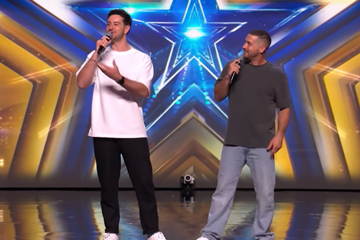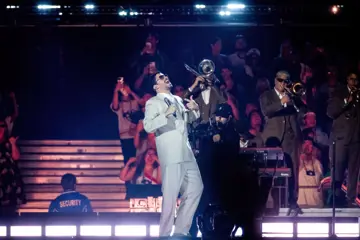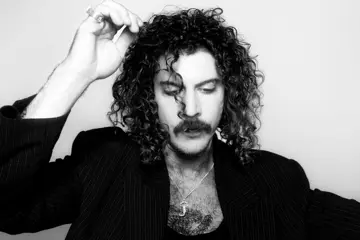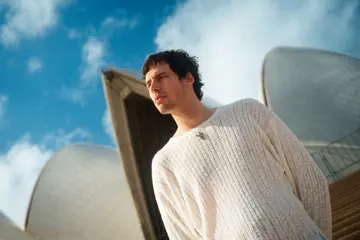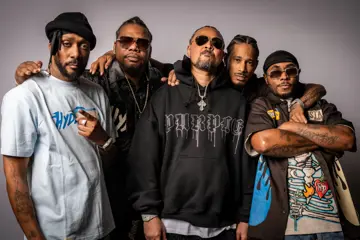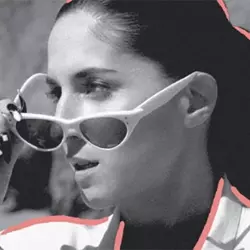 Nite Jewel
Nite JewelIn many ways, the passage of Nite Jewel's music has mirrored the arc of the synthesiser rise in indie music. When Ramona Gonzalez arose, as Nite Jewel, in 2008 – a self-pressed CD-R called, sweetly, My CD, doing the blogospheric rounds – her music was wobbly and lo-fi, taking place in a hazy, smeary soundworld whose claggy eight-track tape hiss made it play like a form of pop-cultural time travel. After her first proper LP, Good Evening, a run of EPs and 12” – 2009's Want You Back and What Did He Say? (the latter pressed up by Johnny Jewel's Italians Do It Better), 2010's Am I Real?, 2011 singles She's Always Watching You and It Goes Through Your Head – grew progressively higher in fidelity; the synth sounds cleaner and more digital, the songs starker, slicker, funkier.
Talking to Gonzalez about Nite Jewel's beginnings, or evolution – or, indeed, about the synth-centric sound of her project – yields interesting results. The 27-year-old is a philosophical conversationist and thinker – she, indeed, holds a degree in philosophy – but that doesn't extend to how she conceives, and speaks, of her own music. “I'm not really a super-conceptual creative worker,” Gonzalez says, almost halfway as apology. “I'm very conceptual when it comes to thinking about the world, about philosophy and politics and life, but when it comes to art I go more on feeling. Nite Jewel was just something I started doing because I had a facility to do so on my own. I had never had a home recording set-up, on my own, before that. It was a very exciting thing to suddenly have. It was like I was able to record my own thoughts. The Nite Jewel 'sound', that was just the sound that came naturally; what I sounded like when I recorded by myself. It just happened. That's the weird thing.”
Gonzalez grew up in Oakland, encouraged towards creativity. “My mum was a dancer, but she was moreso a hippy,” Gonzalez recalls, “we did a lot of these world-music, camping, hippy culture weekends out in Northern California; a lot of singing, a lot of music.” She was also fond of writing her own songs. After her pre-adolescent yen for songwriting faded, she was inspired to begin writing again when in college at NYU, when she met her future collaborateur, future husband, and future Ariel Pink's Haunted Graffiti member, Cole Marsden Greif-Neill.
The couple were hitched in 2006, and relocated to Los Angeles. There, Gonzalez would eventually begin Nite Jewel, instilled by the spirit of the scene that surrounded her. “I was definitely inspired by my friends who were making similar sort of moves, musically,” Gonzalez recalls. “Not harmonically or compositionally, songwise, just process. Hanging out with people like Ariel Pink, Gary War, Julia Holter – who I didn't know super-well, but well enough – and Geneva Jacuzzi, we were all just at home, in our bedrooms, doing pretty much the same thing: making these really random, really individual songs. And then we'd come together and we'd record together. When you're around people that much, and you're really deep in it, you can't help but be a part of some organism.”
Don't miss a beat with our FREE daily newsletter
Not long after posting her first songs to MySpace – this was, after all, 2008 – Gonzalez found an eager audience and had her stumbled-into-home-recording project perceived and interpreted by others. “I was sort of surprised with the fact that the world took to it,” Gonzalez says. “That was pretty cool to me. I wasn't too concerned with how they took to it; with any artist, the world almost invariably has a vast misunderstanding, always. There's a few people who really understand you, but for the most part what the world sees is not how you see yourself. Everyone wants to see some grand intention, and when there isn't really one, it's not as exciting.
“So, I think people put a lot of intention into my music that wasn't really there; like they ascribed these often quite complex thought processes behind certain songs or certain sounds that wasn't really there. They heard it, and interpreted it in a way that, essentially, tried to create this polemical content that wasn't really actually there. There's a polemical element in my lyrics, I know, but that's just for me; I'm just trying to say something to myself. I'm not trying to say something about music; I'm not trying to say anything about music. People seemed to think I was taking this very meta-approach, like there were layers of commentary in my songs. But it wasn't that difficult. It wasn't so complex. It was really simple!”
Though peers like John Maus have discussed the use of synthesisers on that meta and philosophical level – with their rise throwing challenging the long-held orthodoxy of the electric guitar as centre of the rock'n'roll world – Gonzalez makes music from, she considers, an insular position; she, effectively, an eternal bedroom act, retreating into the same sort of dreamworlds she did as a child. “It's a strength and a weakness that I have to always write for my own very insular perspective of what I want to hear,” Gonzalez says. “I think that really talented artists are able to merge that over time with the public perception; and I don't think I'm anywhere nearly there yet. I don't necessarily think that I need to do that. There's a lot of musicians that I really admire that do do that: Prince or Neil Young or whatever; the greats. But I'm nowhere near that.”
In that way, One Second Of Love – the hi-fi counter to Good Evening's lo-fi beginnings – was a work neither hoping for audience accessibility, nor a work of considered change. “At the time I was making One Second Of Love,” Gonzalez says, “I was listening to a lot of instrumental electronic music and new-age music; not popular new-age music, but more underground, synth-soundscape stuff. The thing that was the overarching 'theme' of this music – what it had in common, and perhaps what was interesting me in it – was that it was all electronic music that had been recorded in high fidelity. Or, at least in higher fidelity than I'd ever recorded in, in the past. It was about getting the most out of these really simple synth sounds. Going with that, and sort of mulling over really simple instrumental things. I was really inspired by Another Green World, by Brian Eno, and I was reading his biography about when that was made. Initially, One Second Of Love was going to be this instrumental record, and I went to record it at a friend's studio in Berkeley, and wanted to record just a bunch of instrumental jams on two-inch tape. We filled about an hour of tape in about a week, and those turned out to be the basic tracks of the recording. Again, it had really nothing to do with anything, except for my musical interests at the time, and my flights of fancy. It wasn't a considered attempt to do or say anything; it's just what I was thinking, what I was feeling, and where that took me.”
Nite Jewel will be playing the following dates:
Thursday 31 January - GoodGod Small Club, Sydney NSW
Friday 1 February - Laneway Festival, Brisbane QLD
Saturday 2 February - Laneway Festival, Sydney NSW
Sunday 3 February - Laneway Festival, Footscray VIC
Monday 4 February - The Workers Club, Fitzroy VIC
Friday 8 February - Laneway Festival, Adelaide SA
Saturday 9 February - Laneway Festival, Perth WA



